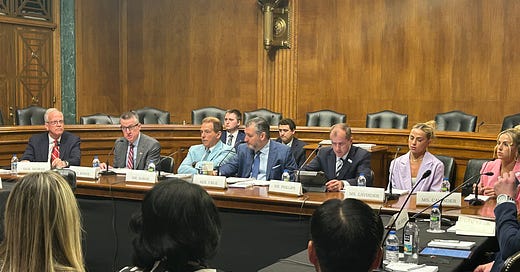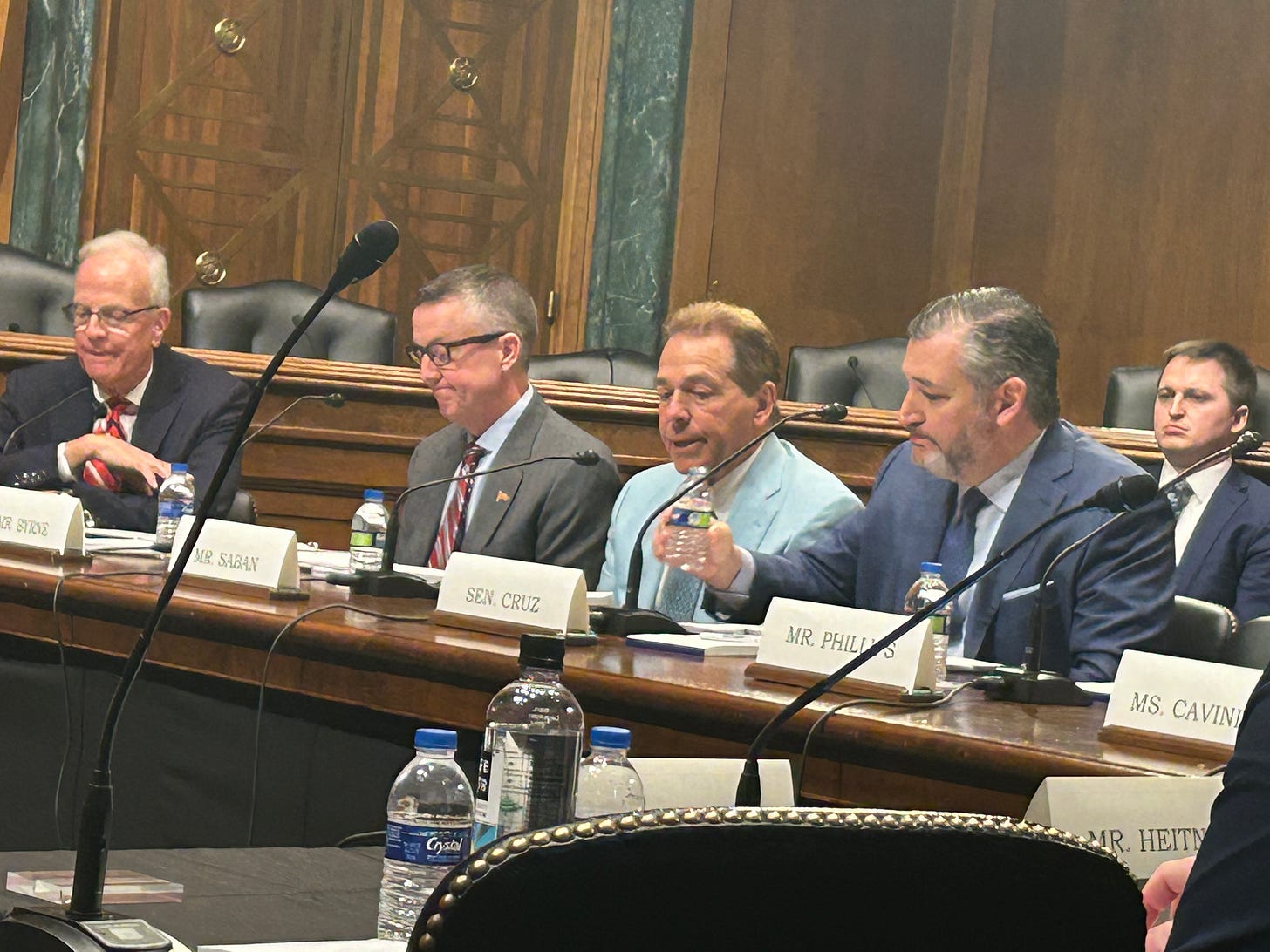Why the Capitol Hill NIL Roundtable Was a Step in the Right Direction
As Nick Saban, Jim Phillips and the Cavinder twins met with members of Congress, the people on Capitol Hill gained a better sense of what's happening in the NCAA
WASHINGTON D.C. — As Name, Image and Likeness deals, the transfer portal and television money continue to alter college sports as we know them, former Massachusetts governor and current NCAA president Charlie Baker has turned to his friends in the nation’s capitol for a federal NIL law.
Former Miami women’s basketball guards Haley and Hanna Cavinder, ACC commissioner Jim Phillips and recently retired Alabama football coach Nick Saban joined U.S. Sens. Ted Cruz (R-TX), Jerry Moran (R-KS) and Richard Blumenthal (D-CT) among others on Capitol Hill late Tuesday morning to host a roundtable on the future of college athletics.
On June 27, the NCAA sent a letter to its member schools to reiterate that the organization’s rules supersede state laws, as all members of the NCAA joined the organization voluntarily. Nearly one month later, on July 20, Moran joined Blumenthal and Cory Booker (D-NJ) to propose the College Athletes Protection & Compensation Act. One week later, Cruz submitted a discussion draft, which received support from Baker, the SEC, Big 12, Texas, Texas A&M, Baylor, Houston, TCU, Texas Tech and Notre Dame.
Tuesday’s roundtable didn’t result in the crafting of any new legislation, but it did serve as an opportunity for senators and college sports figures to get things off their chests and take another step toward finding common ground on a bill to regulate NIL practices nationally.
The most notable points came from perhaps the most famous person on the panel, former Alabama head football coach Nick Saban.
Saban led off by lamenting the lack of competitive balance in college sports due to NIL, and shared stories of phone calls he’s had with NFL coaches recently. According to Saban, NFL coaches are describing the modern rookie as less developed and resilient, and more entitled.
All of it, he says, contributed to his retirement after the 2023 season. Now, the seven-time national champion is offering solutions to help fix college sports.
Firstly, Saban wants to see a revenue-sharing model in the NCAA, similar to what the professionals negotiate in their collective bargaining agreements. Before a 2021 Supreme Court ruling forced the NCAA to adopt NIL policies, revenue sharing was the argument taking the country by storm as the players were the ones directly impacting ticket and merchandise sales, as well as television viewership.
With college athletes receiving the “entitled” label now, Saban believes the NCAA needs to get back to making its student-athletes earn things.
“I think the No. 1 solution to all this is we can have some kind of a revenue sharing proposition that did not make student-athletes employed,” Saban said. “I think you could create a better quality of life for student-athletes. You could still emphasize development personal, academic and athletic development with a system like that. It would be equal.
… You're still gonna be able to create opportunity. So it's a more relative approach to how we go forward. We can make quality of life better for the players that are not employees. They still have Name, Image and likeness opportunities. So the ladies over here, they certainly do Name, Image and Likeness, they still have those opportunities. But it’s not gonna be created. It's going to be something that they all earn.
In other words, I'm not really for collectives — and I respect what these folks over here do, but I think those funds should go to the institution not to create opportunities. Bryce Young had a Nissan deal and he had a Dr. Pepper deal. He had a BMW deal that was a national deal. He earned those. That’s what Name, Image and likeness was supposed to be.”
Saban went on to point out the current structure of the NIL ecosystem creates a competitive imbalance because some schools and collectives have the ability to raise more donor money than others. However, as NIL attorney Darren Heitner and The Collective Association president Russell White pointed out during Tuesday’s roundtable, relying on donors to fund collectives is not sustainable.
Donors send loads of money to their alma maters/local schools routinely, but it adds up. In addition to that, Saban says he’s been told by donors that the transfer portal has turned them off from donating to NIL collectives — although some of those people most likely donated money to get an athlete out of the portal.
“I’ve already had people come to me and say, ‘I don’t want to continue to do this,’” Saban said. “‘Because we’re paying a player, and then the player’s not there. He transferred. So we don’t even get the benefit of watching the player that we were supposed to get to watch.”
Tuesday also served as another opportunity for the powers that be to advocate against recognizing student-athletes as employees. Saban, Byrne and Phillips made sure to point out that employee status would not only require student-athletes to file taxes in the state of their school, but every state they play a game in.
They also spoke about how many tax-free benefits would no longer be available to student-athletes, which would make schools seriously consider cutting most of their Olympic sports.
“Additional benefits for student-athletes has never been greater than it is today,” Phillips said. ‘Whether it's cost of attendance, Alston, Name, Image and Likeness, for mental health support, academic support, unlimited meals, travel. …If you classify them as employees, then I think a bunch of those benefits go away.
…The funding of the department for 20 sports, 22 sports, 28 sports comes from two sports in generalities. 85% comes from the sport of football. Nearly 15% comes from men's basketball. We can pay those athletes. Certainly, we can pay those athletes. And then we can pay from a timeline standpoint, the equivalent number of female athletes. …And then you go from 28 sports to about six sports in a matter of one fiscal year.”
Phillips noted that the Power 5 commissioners have been to D.C. “12-15 times” in the last year. Not only have they gotten familiar with Congress, but the NCAA and the American court system have come to know each other recently with judicial rulings imposing temporary bans on the NCAA from enforcing both NIL and transfer portal rules.
However, Tuesday’s roundtable may have been the most productive meeting Congress has had regarding NIL. Sources tell ALL 52 that Congress has been willing to help the NCAA, but wants specifics from the organization about what it wants addressed in a federal law.
Sen. Marsha Blackburn (R-TN), who proposed the NCAA Accountability Act with Booker, said she has been unhappy with Baker during Tuesday’s roundtable.
Regardless, Cruz, Blackburn and countless other decision-makers were able to hear from a Power 5 commissioner, the best football coach of the generation, the athletic director of a school that perennially competes for SEC championships in football and men’s basketball and two NIL superstars about the best ways to move forward.
There may not be a bill written this month, but Congress now has an outline to propose the splitting of revenue and the objection to classifying student-athletes as employees. Rules on collectives and transparency will still be a debate, but at least the folks on Capitol Hill are one step closer to getting something significant in writing — and the vibe in the room was very bipartisan.
However, as Moran said, “We ought to be a Congress of accomplishments, not efforts.”





